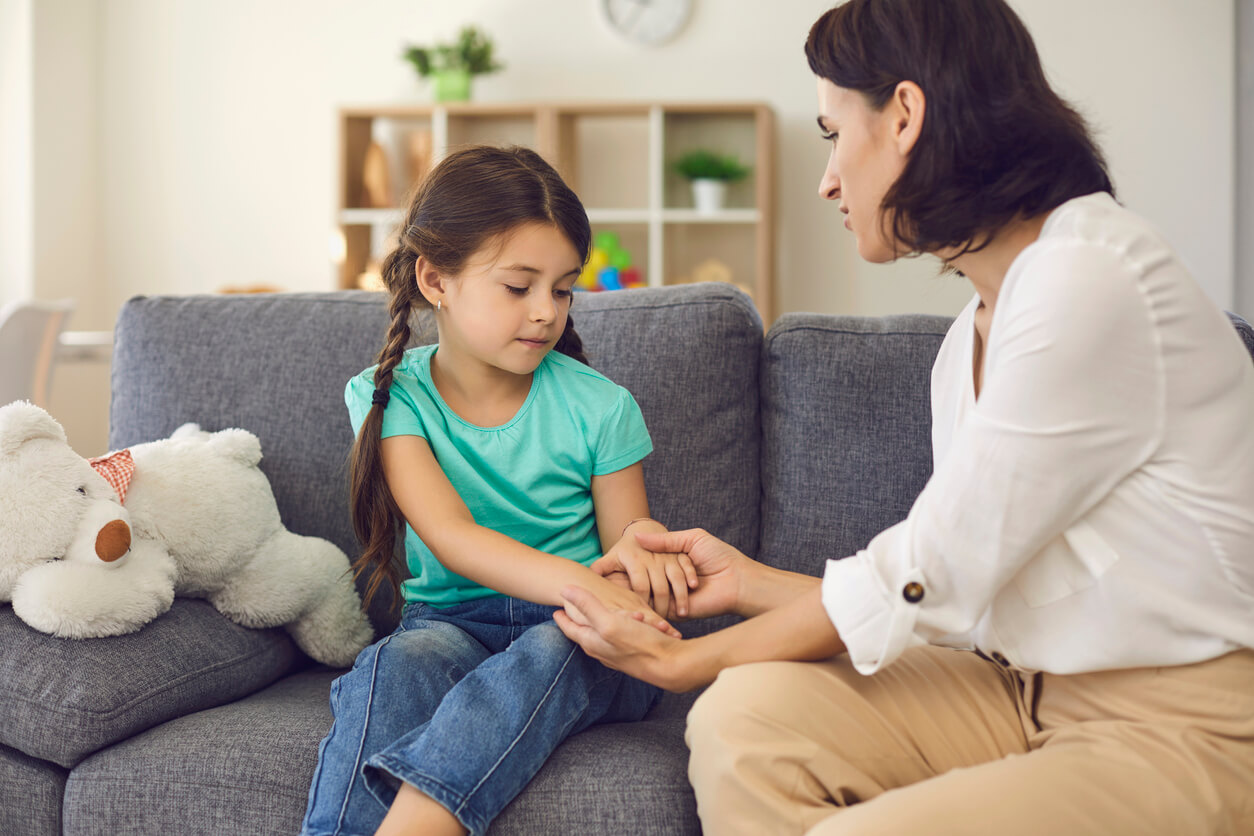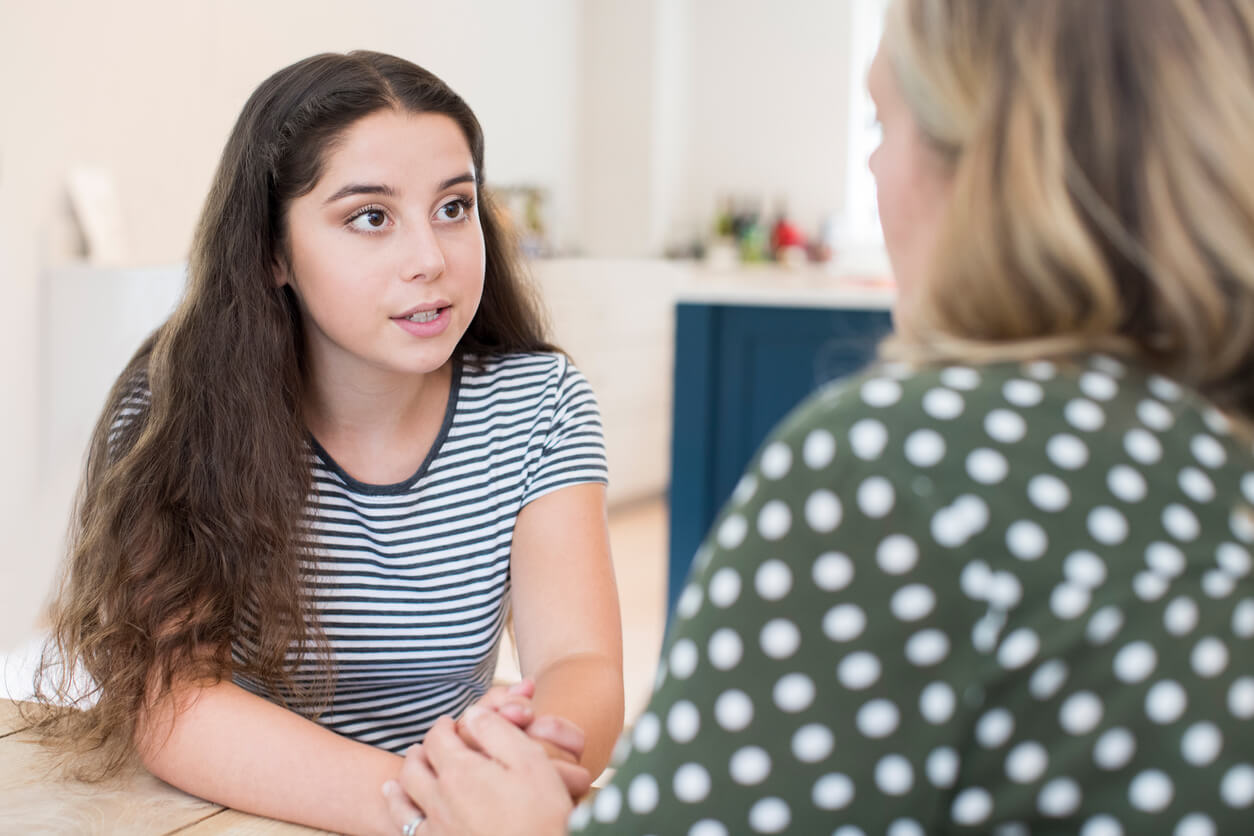8 Questions to Get to Know Your Young Children Better


Written and verified by the psychologist Mara Amor López
During their first years of life, children are expressive and open. Then they grow up and, when they reach adolescence, they’re much more withdrawn and it’s harder for us to reach them. That’s why it’s important to get to know your young children better in order to develop a strong bond with good communication in the future. This will prevent them from becoming strangers, even if they live in the same house.
To initiate conversations with the little ones, we can use some questions that encourage our bond with them. In this way, we’ll get to know them better and they won’t feel ashamed to tell us about their problems. It’s very important that all children feel listened to and cared for at home. Below, we’ll suggest a list of questions that you can use to get to know your children better.
Why is it important to get to know your young children better?
Getting to know our children well goes far beyond our responsibility as parents. What’s really important is to have a deep bond and relationship with them, to know their goals and dreams, but also their fears and insecurities. All this will help us forge a solid bond that will last and stand the test of time.
If we’re concerned and interested in what our children feel, want, and think, we’ll be validating their emotions, and this will reinforce their self-confidence and self-esteem. Listening to them, paying attention to them, and talking to them about their thoughts and ideas is a good resource to know their weaknesses and strengths, and thus help them manage them in a better way.
Another one of the reasons why it’s important to know your young children better is to show them how much you love them and how important they are to you. This will lay a solid foundation for a good relationship with them as they grow up and reach adolescence.

Questions that can help you get to know your young children better
These questions below can help you get to know your young children better and encourage conversations with them. In this way, you’ll build a strong bond that will last.
1. What do you like and dislike most and least about yourself?
One way to get to know what your children think about themselves is to ask them about what they like and dislike about themselves. This question can also help them think about their weaknesses and strengths. It can also help us get an idea of how they feel and what their self-esteem is like.
2. What three wishes would you make if you could?
With this question, you can get to know your children better, as their wishes are a reflection of their aspirations and help you discover their personality, values, and priorities in life. You can also ask about the wishes they would make for their future life. In this way, you can find out how the child sees themselves as an adult.
3. What are your goals for this new school year? How are you going to achieve them?
This question will make them think about what they want to achieve this new school year and what tools and resources they’ll have to do so. This way, you can motivate them and help them reach those goals.
4. What do you like to do for fun?
This question can help you find out what things they like to do for fun. This way, you can have fun together. This is a good way to nurture your relationship and improve your bond.
5. What’s your biggest worry?
Finding out what worries your little one the most also helps you get to know them better. Also, if fears and worries are shared, they don’t weigh as much.

6. What do you like most and least about school?
By asking about school, we can really find out how our children are doing there and if they have any problems or difficulties. Also, we can ask if they have friends and how their relationships with their classmates and teachers are.
7. What are you embarrassed about?
There are children who are very shy and are embarrassed about everything, while others have only a few moments of introversion. With this question, we’ll be able to know exactly what the situations are that make the child most embarrassed and help them overcome them.
8. What are you proud of?
With this question, children have to think about their strengths, as thanks to these, they have achieved those things they’re proud of. This is a way to help them increase their self-esteem and for you to get to know them better.
On the importance of getting to know your young children better
As you’ve seen, it’s not only getting to know your young children better that’s important, but also fostering family communication, so these questions can help you. To achieve this, it’s important to be patient, listen to them, understand them, take an interest in their lives, and encourage the expression of their emotions from an early age. Don’t forget that a good dialogue with children will lay the foundations for a secure communication with them in the future when they’re teenagers.
During their first years of life, children are expressive and open. Then they grow up and, when they reach adolescence, they’re much more withdrawn and it’s harder for us to reach them. That’s why it’s important to get to know your young children better in order to develop a strong bond with good communication in the future. This will prevent them from becoming strangers, even if they live in the same house.
To initiate conversations with the little ones, we can use some questions that encourage our bond with them. In this way, we’ll get to know them better and they won’t feel ashamed to tell us about their problems. It’s very important that all children feel listened to and cared for at home. Below, we’ll suggest a list of questions that you can use to get to know your children better.
Why is it important to get to know your young children better?
Getting to know our children well goes far beyond our responsibility as parents. What’s really important is to have a deep bond and relationship with them, to know their goals and dreams, but also their fears and insecurities. All this will help us forge a solid bond that will last and stand the test of time.
If we’re concerned and interested in what our children feel, want, and think, we’ll be validating their emotions, and this will reinforce their self-confidence and self-esteem. Listening to them, paying attention to them, and talking to them about their thoughts and ideas is a good resource to know their weaknesses and strengths, and thus help them manage them in a better way.
Another one of the reasons why it’s important to know your young children better is to show them how much you love them and how important they are to you. This will lay a solid foundation for a good relationship with them as they grow up and reach adolescence.

Questions that can help you get to know your young children better
These questions below can help you get to know your young children better and encourage conversations with them. In this way, you’ll build a strong bond that will last.
1. What do you like and dislike most and least about yourself?
One way to get to know what your children think about themselves is to ask them about what they like and dislike about themselves. This question can also help them think about their weaknesses and strengths. It can also help us get an idea of how they feel and what their self-esteem is like.
2. What three wishes would you make if you could?
With this question, you can get to know your children better, as their wishes are a reflection of their aspirations and help you discover their personality, values, and priorities in life. You can also ask about the wishes they would make for their future life. In this way, you can find out how the child sees themselves as an adult.
3. What are your goals for this new school year? How are you going to achieve them?
This question will make them think about what they want to achieve this new school year and what tools and resources they’ll have to do so. This way, you can motivate them and help them reach those goals.
4. What do you like to do for fun?
This question can help you find out what things they like to do for fun. This way, you can have fun together. This is a good way to nurture your relationship and improve your bond.
5. What’s your biggest worry?
Finding out what worries your little one the most also helps you get to know them better. Also, if fears and worries are shared, they don’t weigh as much.

6. What do you like most and least about school?
By asking about school, we can really find out how our children are doing there and if they have any problems or difficulties. Also, we can ask if they have friends and how their relationships with their classmates and teachers are.
7. What are you embarrassed about?
There are children who are very shy and are embarrassed about everything, while others have only a few moments of introversion. With this question, we’ll be able to know exactly what the situations are that make the child most embarrassed and help them overcome them.
8. What are you proud of?
With this question, children have to think about their strengths, as thanks to these, they have achieved those things they’re proud of. This is a way to help them increase their self-esteem and for you to get to know them better.
On the importance of getting to know your young children better
As you’ve seen, it’s not only getting to know your young children better that’s important, but also fostering family communication, so these questions can help you. To achieve this, it’s important to be patient, listen to them, understand them, take an interest in their lives, and encourage the expression of their emotions from an early age. Don’t forget that a good dialogue with children will lay the foundations for a secure communication with them in the future when they’re teenagers.
All cited sources were thoroughly reviewed by our team to ensure their quality, reliability, currency, and validity. The bibliography of this article was considered reliable and of academic or scientific accuracy.
- Comesaña, J. M. C. (2011). Bases para construir una comunicación positiva en la familia. Revista de investigación en educación, 9(2), 91-98. Disponible en: https://dialnet.unirioja.es/servlet/articulo?codigo=4731297
-
Ruíz León, L. M. (2019). La Comunicación Asertiva para la Resolución de Conflictos en Niñas y Niños del Contexto Escolar. Disponible en: https://repositorio.unillanos.edu.co/handle/001/1496
This text is provided for informational purposes only and does not replace consultation with a professional. If in doubt, consult your specialist.








